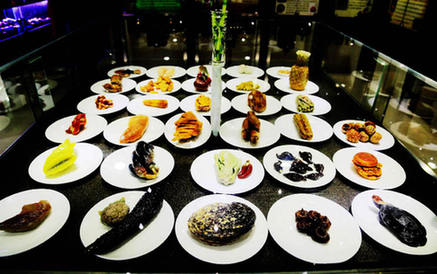Everything Is Collectable!
By staff reporter SEBASTIEN ROUSSILLAT
Does the French word “chiner” (antiquing) come from the Chinese love for flea markets and antiques? Perhaps not. But it is certain that the Chinese are serious collectors and this love didn’t come from nowhere!
It isn’t difficult to see that collecting is fashionable among Chinese, not only at home but also in America and Europe. More and more Chinese connoisseurs and investors are filling auction houses to bid on antiques. Some are hoping to reclaim some of the Chinese artifacts that vanished during the Opium Wars and after; others are simply hunting for bargains.
This is not just a phenomenon among the rich and powerful. Collecting is in fashion all over China, among the middle classes and even in the countryside. Collectors are not only seeking to accumulate expensive artworks or historical artifacts; some are also after old stamps, old objects for daily use, or even old newspapers and books.
 |
|
A 2011 display of stones that resemble different foods. |
Resuming an Old Habit
After living through the tumultuous 1960s, when Chinese customs and traditions were reviled and recanted, modern China has begun to rediscover and appreciate its history and traditional artworks. TV shows dedicated to appraising and identifying ancient relics are flourishing under many different forms. Spectators love to send their old odds and ends to TV shows to be verified and priced. On one of Beijing TV’s best-known programs, if an object is found to be a fake, it is immediately destroyed on camera. This is one means of showing that false items have no place in the Chinese market. There are many websites dedicated to all sorts of collections and auctions, and antique stores are found in every Chinese city.
In the majority of Chinese cities, one can also find open-air flea markets like those at Panjiayuan and Liulichang in central Beijing. Sometimes, buried among the counterfeits, it is still possible to find authentic pieces of ancient history, if you know how to spot them.
Also, for professionals and experts, artwork and antique auctions are on the rise. Many large auction houses such as China Guardian, Poly International Auction, Hanhai and Rongbaozhai regularly organize sales which are eagerly attended.
Why Do You Keep This Old Junk?
This is the question which collectors hear the most from families exasperated by the amount of space at home dedicated to antiques. Is it compulsive accumulation or the pleasure of ownership that pushes the Chinese to hoard their treasures?
In general, one finds that there are four reasons for collecting. First, there is the pleasure of owning pieces of art and history as one’s own, for personal enjoyment. Second, some feel a sense of duty to preserve artifacts from certain periods of Chinese history. Third, many artworks play an inspirational role, notably for artists who want to study and learn from the masters. And finally, they also serve as investments and ornamentations, which are popular in high society and among the nouveaux-riches who appreciate fine culture or at least want people to think so.
